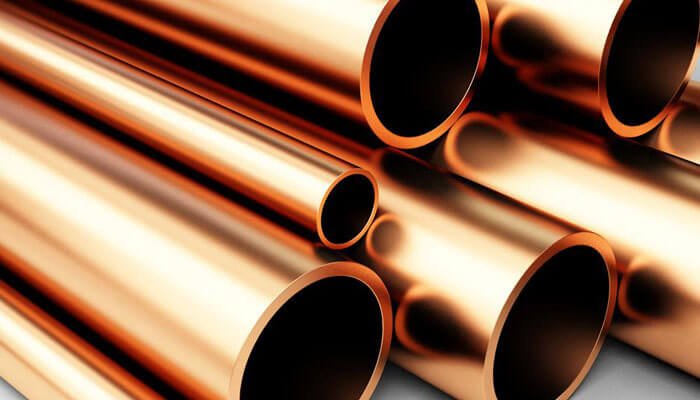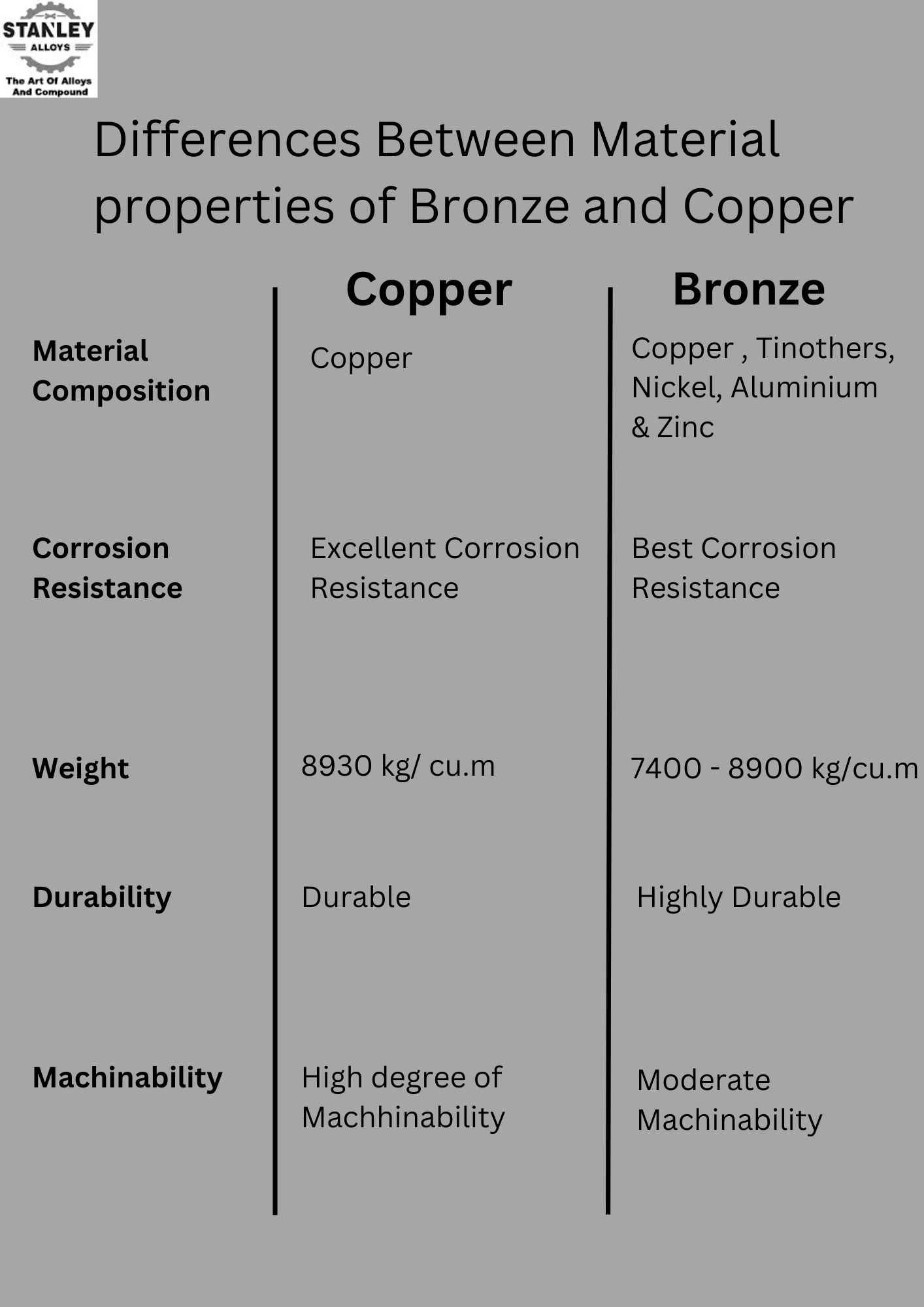What is Bronze?

Bronze is an alloy composed mostly of copper, often with 12-12.5 percent tin and sometimes with the addition of other metals, such as phosphorus, or non-metals, such as metalloids such as arsenic or silicon. These additives produce a range of alloys, some of which may be tougher than copper alone or feature other advantageous properties like strength, ductility, or machinability.
What is Copper?

Copper is a reddish-golden material having a ductile and malleable composition. It is a high thermal and electrical conductor. Copper was the first metal that humans worked on, and it continues to be one of the most often used metals today. Copper readily combines with a range of other metals to create widely used alloys such as brass and bronze. Copper is considered a base metal due to the rapidity with which it oxidises. It is represented by the symbol Cu and the atomic number 29 on the periodic table.
Advantages of Bronze
- Resistance to both corrosion and fatigue. Copper, which is found in bronze, oxidises to form a protective layer that shelters the metal from corrosion-induced degradation. Additionally, it is a durable material with excellent tensile strength, which will aid him in withstanding tension.
- Accuracy on a Large Dimensional Scale In addition, bronze is well-suited for CNC milling and turning services.
- Both thermal and electrical conductivity is quite high. Due to this feature, it is suitable for use in electrical applications where conductivity is crucial.
- The Surface Finishes seem to be Superb Quality. Bronze may be finished using a large array of metal surface finishing techniques. Therefore, it may be used in place of brass in situations where aesthetics play a significant role.
Advantages of Copper
- Both thermal and electrical conductivity is quite high. Copper's substantial usefulness in the electrical and electronics sectors is largely attributable to the fact that metal has this characteristic and is affordable.
- Outstanding ability to be machined. Copper is a ductile metal that can be readily bent, stretched, and shaped without breaking due to its malleability, ductility, and softness. As a consequence, it is a metal that may be utilised to manufacture a wide range of components.
- Corrosion Resistance. Copper has a low reactivity, which reduces the danger of corrosion when it is used. This makes it more advantageous for applications such as pipelines and others that need atmospheric exposure.
- Recyclability, Copper is readily recyclable without any quality loss. This approach is less expensive than the processing of newly mined copper. Furthermore, recycling prolongs the availability of this metal.
Properties of Bronze vs Copper
- The metal bronze is not in its purest form. Copper has been used to create this alloy. Copper is a very unadulterated metal. It is quite helpful for the human existence in general.
- The colour bronze is a metallic version of the colour brown. Copper has a hue that might be described as reddish-brown..
- The maximum heat conductivity may be found in bronze. Copper, on the other hand, is a metal that has a lower heat conductivity than bronze.
- Copper has a higher melting point than bronze does. Bronze has a lower melting point. About 950 degrees Celsius is the temperature at which bronze will melt. The melting point of copper is the highest of any metal. Copper has a melting point of 1084 degrees Celsius.
- Bronze is far more durable than copper. Copper has a softer surface than bronze, which has a higher level of hardness.
- Bronze is much more sturdy and durable. Copper is less durable.
- Bronze is neither flexible nor simple to fix compared to copper. Copper is far more flexible and repairable.
- Tensile strength may range anywhere from 350 MPa to 635 MPa for bronze. Copper has a lower tensile strength than bronze, although it is still rather strong. Copper has a tensile strength of 210 megapascals (mpa).
- Bronze has a lower capability for the conduction of electricity compared to copper. However, in contrast to bronze, the electrical conductivity of copper is much greater.
- The weight of bronze is less than that of copper. Copper, on the other hand, is a hefty metal in comparison to bronze.
- Bronze is an element that is difficult to machine due of its high level of hardness and density. In addition to that, it does not bend very readily. Copper showed more machinability than other metals because to its ability to be fixed, expanded, and robust.

Uses of Bronze VS Copper
Uses of Bronze
- Both historically and now, painters, architects, and sculptors often use bronze in their work. It may be sculpted into various sculptures.
- It may be used to manufacture, among other things, door frames, window frames, mailboxes, furniture hardware, trim, and rails..
- Aluminium bronze is necessary for the production of machine tools and particular bearings.
- Bronze is used in wood ply instead of steel. This is owing to the fact that the metal has no effect on the colour of wood.
- Most of the coins are Bronze metal castings.
Uses of Copper
- Copper is used in the construction of electrical cables, dynamos, motors, transformers, and other forms of electrical equipment due to its superconductivity.
- This metal is used to create a broad range of alloys, including brass, bronze, and German silver, among others.
- Copper is often used in cooking equipment, boilers, and calorimeters as a result of its high heat conductivity.
- It has uses in building construction, the generation and transmission of power, the manufacturing of electrical products, and the movement of persons and commodities.
- Copper was among the first metals used for currency manufacturing.
 "GOVERNMENT RECOGNISED STAR EXPORT HOUSE"
"GOVERNMENT RECOGNISED STAR EXPORT HOUSE"



 India
India Japan
Japan Russia
Russia United States
United States Saudi Arabia
Saudi Arabia Kuwait
Kuwait Singapore
Singapore Malaysia
Malaysia UAE
UAE Germany
Germany Italy
Italy China
China UK
UK Canada
Canada Iran
Iran Thailand
Thailand South Korea
South Korea Turkey
Turkey Morocco
Morocco Costa Rica
Costa Rica Kazakhstan
Kazakhstan Philippines
Philippines Egypt
Egypt Vietnam
Vietnam Oman
Oman Australia
Australia Qatar
Qatar Portugal
Portugal Mexico
Mexico Brazil
Brazil France
France South Africa
South Africa Jordan
Jordan Spain
Spain Hong Kong
Hong Kong Netherlands
Netherlands Indonesia
Indonesia Taiwan
Taiwan Nigeria
Nigeria Bangladesh
Bangladesh Iraq
Iraq Ukraine
Ukraine Poland
Poland Romania
Romania Cyprus
Cyprus Angola
Angola Colombia
Colombia Norway
Norway Chile
Chile Tobago
Tobago Greece
Greece Czechia
Czechia Belgium
Belgium Sri Lanka
Sri Lanka Myanmar
Myanmar Venezuela
Venezuela